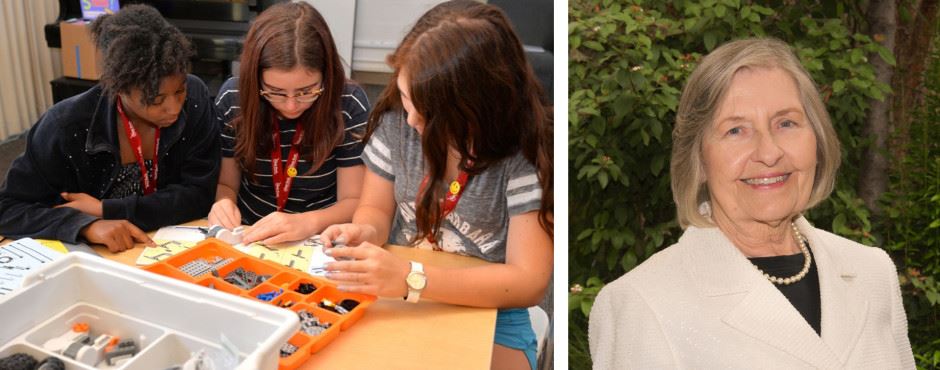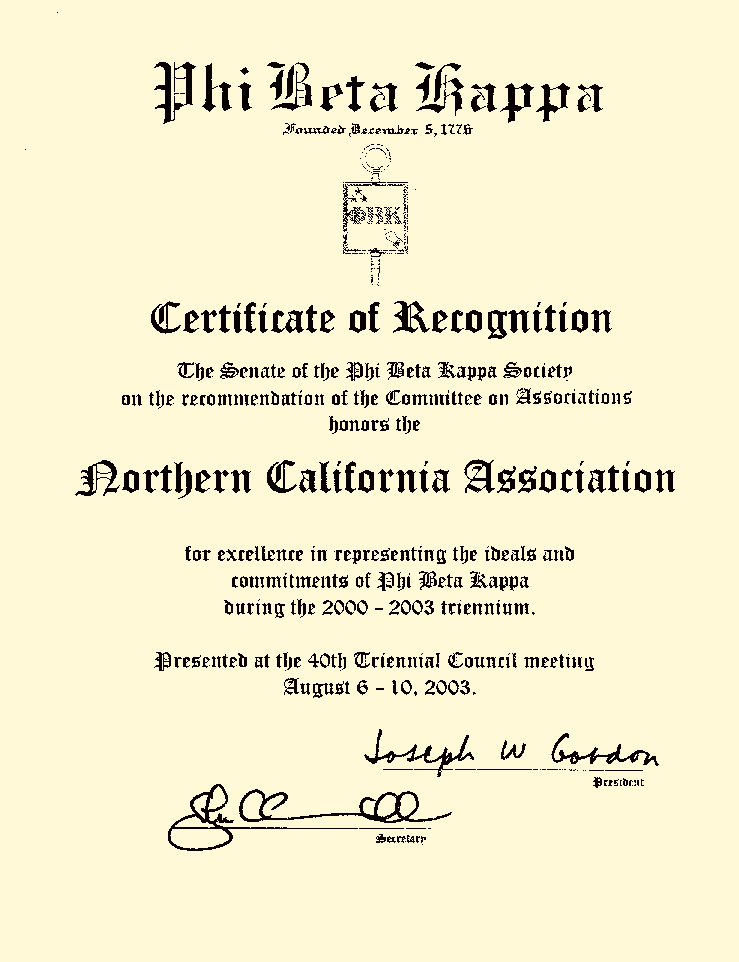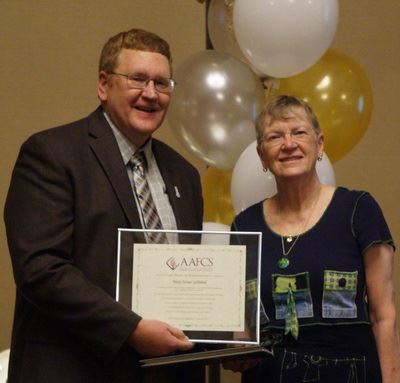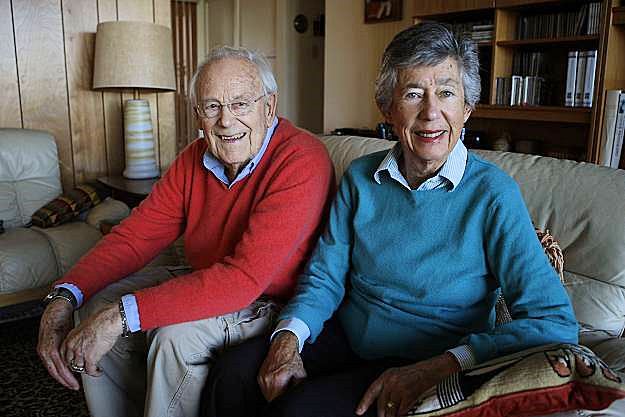| Marci Coglianese, Rio Vista Democratic Club honors former mayor for contributions |
| Emma Steigerwald, UC Berkeley, Mercury News, Feb 28, 2022 Spiders, slugs and seal pups: Wild things stalked for DNA |
| Amanda Gorman at Joe Biden's Inauguration, January 20, 2021 |
| Association Honored by National Society |
| Rolf Beier and Florence Beier - Couple's long road to peace and love |
| Mary Gilliland Receives AAFCS Distinguished Service Award |
| Janiece Nolan Receives the Distinguished Leadership Award |
| Sarah Noël Manney, JD ’24 (BA ’18) |
| Eno Schmidt receives Cupertino CREST Award |
| Marie Wolbach created network of STEM camps for girls |
 On the Frontlines of Deep-Sea Mining: An Interview with President Moetai Brotherson of French Polynesia
On the Frontlines of Deep-Sea Mining: An Interview with President Moetai Brotherson of French PolynesiaThis year, Sarah Noël Manney, JD ’24 (BA ’18), fourth from left, participated in a summer internship through Stanford Law School’s John and Terry Levin Center for Public Service and Public Interest Law and the Stanford Center for East Asian Studies, organized by Jenik Radon, JD ’71, to work with French Polynesia’s newly elected government. As part of her summer placement at the Office of the President of French Polynesia, Manney analyzed the legal framework around deep-sea mining. “Some forms of deep-sea mining have been compared with open-pit mining, and all could potentially be devastating for ocean ecosystems due to ocean currents,” she says. “But it is still an under-examined issue.” Read the full article
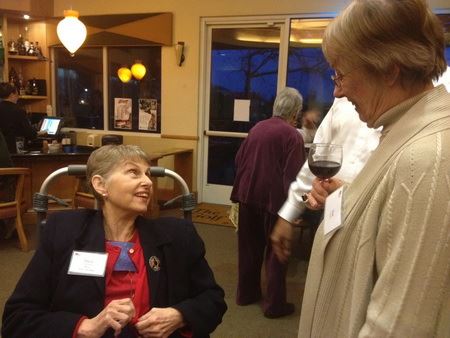
Rio Vista Democratic Club honors former mayor for contributions by Heather Ah San, October 22. 2022
RIO VISTA — Carol Turgeon will never forget the helping hand former mayor Marci Coglianese gave to the Rio Vista Democratic Club.
In 2004, when the small club was just starting up, members approached Coglianese for advice. The Rio Vista mayor not only gave her stamp of approval, Turgeon said she gave the club “the inside dope,” offering her insight of local politics. Though Coglianese was nonpartisan, she was always supportive of the Democratic Club’s efforts, said Turgeon, the club’s treasurer.
The Democratic Club honored Coglianese Wednesday, not only for helping the group but for her service as mayor and work in the community.
“Nine years later, we’ve finally come to thank you,” Turgeon said at the Nines Restaurant at Trilogy. Read the full article here
Emma Steigerwald, UC Berkeley, Environmental Science, Policy, & Management (Reed award)
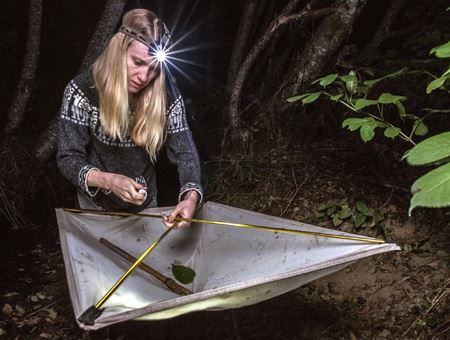 Emma Steigerwald, a Ph.D. candidate at UC Berkeley, collects spiders from vegetation for the California Conservation Genomics Project. By gathering DNA samples from the creatures, scientists aim to genetically decode some of the state’s diverse wildlife.
Emma Steigerwald, a Ph.D. candidate at UC Berkeley, collects spiders from vegetation for the California Conservation Genomics Project. By gathering DNA samples from the creatures, scientists aim to genetically decode some of the state’s diverse wildlife.
Steigerwald of UC Berkeley’s Evolab found Tetragnatha spiders by walking the edges of Marin County’s Lagunitas Creek at night, when spiders are active. Spiders are well camouflaged — but when she beat the vegetation with a stick, the arachnids fell onto a white sheet.
The San Jose Mercury News, 02/28/2022 Front page!
Photo By Anton Sorokin
See the full article here
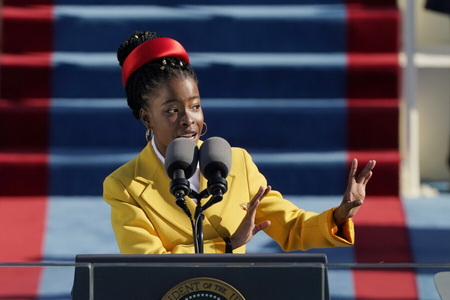 Phi Bete and Harvard alumna Amanda Gorman delivered a soaring inaugural poem
Phi Bete and Harvard alumna Amanda Gorman delivered a soaring inaugural poem
On Wednesday, January 20, 2021, Amanda Gorman, Harvard ’20 stepped up to the podium to deliver the reading during the presidential inauguration of Joe Biden.
Her piece, titled “The Hill We Climb,” called for unity and justice, through both reckoning with the nation’s past and looking toward its future.
The former sociology concentrator is the U.S.’s first youth poet laureate. At 22 years old, she is also the youngest to present the inaugural reading, following in the footsteps of Maya Angelou, Robert Frost, and Elizabeth Alexander.
Former President Barack Obama and Oprah Winfrey lauded Gorman for her performance. The Los Angeles native also received praise from “Hamilton” playwright Lin-Manuel Miranda, which she referenced in her poem.
See the details at https://news.harvard.edu/gazette/story/2021/01/amanda-gormans-inauguration-poem-the-hill-we-climb/
Palo Alto’s Wolbach Gives Girls A Lift Into STEM Fields
Kiwanis Gives Its Angel Award To Woman Who Created Network Of STEM Camps For Girls, September 9, 2017
Rising eighth-graders, left, work on a project during this summer’s Camp Grace Hopper at Stanford, where the Tech Trek program originated in 1998 with an assist from Palo Alto’s Marie Wolbach, right. Wolbach started the program that has expanded to 22 camps this summer and has touched more than 15,000 girls. (Photos courtesy of the American Association of University Women, left, and Judy Kramer of the Palo Alto Kiwanis Club). This article is abstracted from http://www.mercurynews.com/2017/09/29/palo-altos-wolbach-gives-girls-a-lift-into-stem-fields/
The dearth of women working in STEM fields is a hot issue these days. Marie Wolbach was way ahead of the curve. Wolbach got the ball rolling locally in 1998, when she successfully applied for a grant from the American Association of University Women and started a summer science camp for girls. “When I was writing the grant proposal, I could not use the word STEM because nobody knew what it meant 20 years ago,” said Wolbach, who has lived in South Palo Alto for 34 years. “There were many people who said, ‘What’s the value of science camp for girls? Who would want to go to that.’ ” Since then, Wolbach has overseen the program’s expansion nationally, teaching some 15,000 rising eighth-graders in science, technology, math and more. The program now known as Tech Trek has grown to 22 one-week camps in 10 states this summer, including two at Stanford University. For her efforts, Wolbach was named the 2017 winner of the Angel Award bestowed by the Palo Alto Kiwanis Club for significant impact on youths. “Marie Wolbach has single-handedly made this world a far better place by opening the eyes and minds of girls to the power of mathematic and science education,” LaDoris Cordell, a retired Superior Court judge and former assistant dean of the Stanford Law School, wrote in recommending Wolbach for the Kiwanis award. Tech Trek is empowering girls to go to college and explore opportunities once deemed unsuitable for them. Wolbach sees that empowerment reflected in how the girls think. “I’ve noticed the girls that come to camp have changed,” Wolbach said. “We’re seeing maturity and awareness increase in the girls, so that when we see them at 12 and 13 many are focused on what they want to do and how they’re going to get there. And when they first came, there was not nearly so much of that. “I am optimistic. The results are really quite amazing.” All students attend the camps on scholarships from the AAUW. They must be nominated by their math or science teacher, then impress judges with an essay and during an interview. AAUW research shows that Tech Trek alumnae are less susceptible to negative stereotypes about women in STEM, surpass the national average in advanced high school math and science courses, and have been introduced to STEM careers that were previously unknown to them. Camp days begin with morning core classes. The afternoons tend to be project-based and might include a field trip to a tech company or work in robotics, app invention, nanotechnology or forensics led by professional mentors. In the evenings, there are other lessons related to science or the girls’ future, which can include learning about how to pay for college, as well as visits from women professionals who tell about their careers in science or fields related to science. Stanford grad student Nora Jane Brackenbill is among the former Tech Trek campers who have returned to the camps as volunteers. “At Tech Trek, not only did I meet inspiring women in a variety of STEM careers, I also met other girls my age who were interested in science,” Brackenbill said in a news release from the Kiwanis Club. “For the first time, I could envision a future for myself and for my fellow campers in the scientific community.” The AAUW’s decision to hold the camps on university campuses brought an added benefit: It helps girls picture themselves going to college. “Partly because we have the diversity of girls, many had never been on a college campus,” Wolbach said, “and many would write on their evaluations, ‘I never thought about going to college before, but this is beautiful and wonderful. I’m definitely going to college now.’ ” All of the camp courses and labs are hands-on, group learning, no homework, no grading, no criticism. “It is fun, but at the same time, they learn a lot,” Wolbach said. It didn’t take long for Wolbach to realize the impact the camps can have. In the first or second year, a girl wrote her a letter and said that when she got back home she went to math class and moved from the back of the room with the girls to the front of the room with the boys and didn’t hesitate to raise her hand if she knew the answer. “That’s because of Tech Trek,” Wolbach said. Wolbach recalled a very quiet girl from Sacramento who was driven to Stanford by an AAUW volunteer because her immigrant parents did not drive. She was so quiet that other girls in her dorm group worried about her. By the end of the week, she found Wolbach in a group of maybe 400 people and said, “I wish I could stay another week because this was the best week of my life,” then gave Wolbach a big hug. The quiet girl went back home and ran for class president — and won. For Wolbach, the program’s success brings much gratification and gives her hope that things will be better than they were years ago. She became interested in science as a kid, working with her father in his pharmacy. In high school, Wolbach was the only girl in physics class, gaining admission only by convincing the principal that she really wanted to take the course. In 1970, with a nursing background, Wolbach wanted to apply for a physician’s assistant program at the University of Utah. “They wouldn’t take my application because I was female,” she said. Years later, while raising seven children, Wolbach was moved to action after one of her daughters was teased a lot in high school for taking many AP classes and for raising her hand in AP physics and doing well on tests. “I was aware that things were changing a little bit, but I really wasn’t so invested in this until (then),” she said. “I realized that, OK, we’re 25 years later and things aren’t changing. Maybe something should be done.” Raising a family and working part-time precluded her from taking action, then in 1991 she was motivated by an AAUW study titled “Shortchanging Girls, Shortchanging America,” which focused on the way girls perceive being in math and sciences and how they drop out around middle-school age despite often being among the best in those classes. “They didn’t have the confidence they could have. They were told, ‘Oh, these are hard classes,’ they take maybe more homework, and they’d rather be doing something with their friends and they got discouraged. All of the factors were in that report that I could relate to, that we were observing around us even in 1992.” The Kiwanis Club award comes with a $1,500 prize that will help fund the camps. Wolbach will receive the honor in an Oct. 19 ceremony at the Sheraton Palo Alto. See pictures from Tech Trek Sonoma 2016 here See also https://www.paloaltoonline.com/news/2015/07/28/palo-altan-honored-for-creation-of-girls-stem-camp Association Honored By National SocietyOur Association received a significant honor at the concluding banquet of the Triennial in Seattle Aug. 6-10, 2003. The award included a check for $1000 that we may use for either our endowment or scholarship fund. We also received the certificate pictured below. The wording on the Certificate of Recognition is: "The Senate of the Phi Beta Kappa Society on the recommendation of the Committee on Associations honors the Northern California Association for excellence in representing the ideals and commitments of Phi Beta Kappa during the 2000 –2003 triennium.* Presented at the 40th Triennial Council meeting August 6-10, 2003". (Signed by Joseph W. Gordon, President and John Churchill, Secretary) *From the Key Reporter, Fall 2003, issue: "...among its accomplishments were presenting 15 speakers and other events in the past year; organizing an annual retreat at (Asilomar) State Conference Center, presenting honoraria for teaching excellence to four area professors; awarding scholarships to nine graduate students at area institutions; and producing a newsletter and website." Our President, Mary Hanel is shown receiving the award.
|
Mary Gilliland Receives AAFCS Distinguished Service Award
AAFCS 2016-17 President Duane A. Whitbeck, Ph.D., (left) presents Mary Turner Gilliland (right) with the AAFCS Distinguished Service Award during the AAFCS 108th Annual Conference in Dallas, Texas. Gilliland Receives AAFCS Distinguished Service Award Alexandria, VA–The American Association of Family & Consumer Sciences (AAFCS) honored its 2017 Distinguished Service Award recipients at a ceremony during the 108th Annual Conference & Expo in Dallas, Texas. Among those selected for the prestigious award is Mary Turner Gilliland, a long-time AAFCS member who has made a positive impact on family and consumer sciences in the U.S. and abroad. Mary Turner Gilliland has been a member of AAFCS continuously for more than 48 years, serving throughout that tenure at the local, district, state, national, and international levels. As a student at the University of California at Santa Barbara, she chaired her student chapter of California AHEA (now AAFCS). Post-graduation, she has served the California Affiliate in many capacities, including treasurer. At the national level of AAFCS, she offered consistency as a Senate delegate from 1985-2005, and provided leadership on the global nature of the family and consumer sciences field as the leader of the Community of Global Perspectives from 2008-2011. About the American Association of Family & Consumer Sciences (AAFCS) Field of Family & Consumer Sciences For more information, please contact: Rolf Beier And Florence Beier -
|

